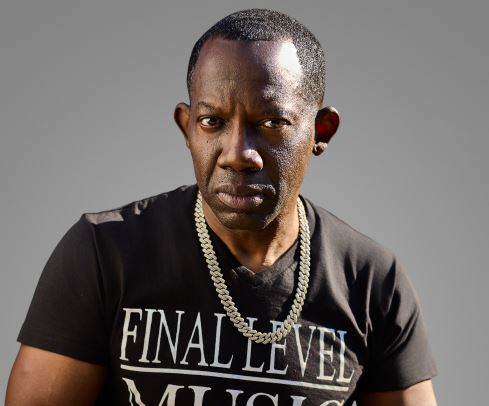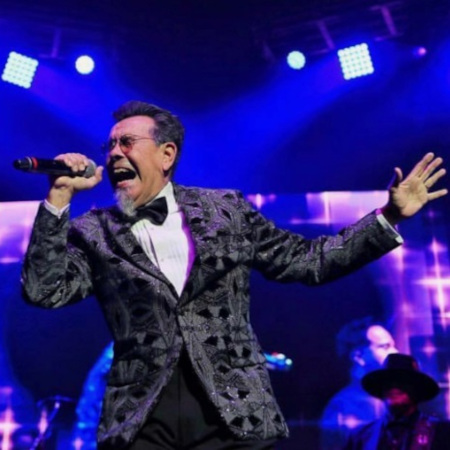
Morning Session Featured Speaker
Rapper-Producer Henry “Hen-Gee” Garcia
Pioneer, Innovator, Founding Architect, and Unofficial Cultural "Mayor" of West Coast Hip Hop; also Founding Member of The Latin Froz, instrumental in creating space for bilingual lyricism and Afro-Latino identity within a predominantly lighter-skinned hip-hop landscape.
Henry “Hen-Gee” Garcia is an American rapper, producer, and cultural advocate whose work has left an indelible mark on the West Coast hip-hop scene. Born in Brooklyn, New York, to Honduran parents, Hen-Gee came of age during the formative years of East Coast hip-hop. Alongside his younger brother Eric—better known as DJ Evil E—he absorbed the rhythms and rhymes of the New York streets before the duo relocated to Los Angeles. There, they became early architects of a burgeoning West Coast movement that would go on to reshape the sound and spirit of hip-hop.
In their early days, Hen-Gee and Evil E performed as the “Spin Masters,” showcasing their DJ skills and building relationships with rising West Coast artists such as Kid Frost. Their deepening involvement in the scene led them to link up with the legendary Ice-T, ultimately becoming key members of the influential Rhyme Syndicate collective. Hen-Gee and Evil E were not just background players—they appeared in Ice-T’s early music videos and live performances, bringing a dynamic presence and multicultural flair to the stage. In 1991, the Garcia brothers released their own single, “Brothers,” a celebration of their bond and bilingual identity.
Hen-Gee distinguished himself not only through his beats and bars but also by proudly embracing his Afro-Latino heritage. He frequently rapped in Spanish and used his platform to spotlight Latino talent in a genre that had often overlooked their voices. His dedication to representation extended beyond the studio: Hen-Gee has worked behind the scenes as a manager for artists and producers, combining creative instincts with sharp business acumen.
Equally committed to community empowerment, Hen-Gee has championed arts education in underserved neighborhoods. Through initiatives like the “El Movement After School Program,” he has introduced young people to music and other creative outlets, mentoring the next generation of artists and leaders.
Today, Hen-Gee remains a vital force in hip-hop. Whether through storytelling, mentorship, or performance, he continues to honor the culture that shaped him while paving the way for those who follow.

Afternoon Session Featured Speaker
Little Willie G (Willie Garcia)
The Godfather of Brown-Eyed Soul, Legendary Chicano vocalist and songwriter, Thee Midniters
Little Willie G, born Willie Garcia, emerged as one of the most electrifying voices of East Los Angeles during the golden age of Chicano rock & roll in the 1960s. As the charismatic frontman of Thee Midniters, a pioneering Eastside band blending R&B, doo-wop, soul, Latin rhythms, and British Invasion sounds, Willie helped define a movement. Their unforgettable sound resonated across Southern California and beyond, becoming a soundtrack for an entire generation of Chicano youth.
With hits like the cruisers' anthem “Whittier Boulevard” and a searing version of “Land of a Thousand Dances,” Thee Midniters were headliners wherever they played. But their music was more than entertainment—it was cultural expression. Songs like “Chicano Power” and “The Ballad of César Chávez” signaled the group’s embrace of the growing Chicano Movement, with Willie’s voice carrying the pride and pain of his community.
Garcia’s musical journey began in South Central Los Angeles, where he grew up in a racially diverse neighborhood steeped in cultural history. His older brother encouraged his early musical talent, and by age nine, Willie had already won a talent contest. He soaked in influences ranging from Jackie Wilson and James Brown to Pedro Vargas and Javier Solís, and from Frank Sinatra to Nat King Cole. These wide-ranging inspirations informed his dynamic vocal style and magnetic stage presence, which he further honed watching live acts at L.A.’s famed Million Dollar Theater.
In the late ’60s, as music and culture shifted, Willie left Thee Midniters and experimented with a solo career under the name Antonio Garcia, performing on iconic Sunset Strip stages like the Whisky a Go Go and the Troubadour. He later teamed up with Little Ray Jimenez to form God’s Children, a genre-defying group that recorded for Uni Records and sang the theme song for the TV series Matt Lincoln.
In the mid-1970s, Garcia joined Malo, the Latin rock band known for “Suavecito,” and recorded the critically praised Ascension album. He toured with legends like Tower of Power and the Temptations, but soon faced the dark side of fame—addiction. A spiral into heroin and cocaine use nearly ended his career, but with the support of loved ones and the transformative power of faith, Garcia overcame his struggles. A born-again Christian, he has since dedicated his life to both music and ministry.
Based in Whittier, California, Willie continues to perform both as a solo artist and occasionally with Thee Midniters. He remains a beloved cultural icon, not just for his voice but for his resilience and unwavering commitment to his community. Little Willie G’s influence echoes through generations of Chicano musicians and fans. Whether sparking romance on the dance floor or igniting political pride, his songs continue to connect deeply with audiences. “What I hope to do with my music,” he says, “is to have people connect. These songs tell the stories of their lives.”
Little Willie G, the iconic voice of Thee Midniters, was barely an adult when the band released the classic ode to Whittier Boulevard — the place where kids cruised for hours on a Saturday night back in the 60s. East Los Angeles has changed quite a bit since then, but Little Willie G hasn't forgotten. Here's an audio postcard produced by Betto Arcos and Eric Pearse-Chávez for KPCC's 'Take Two'.